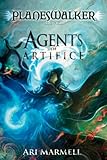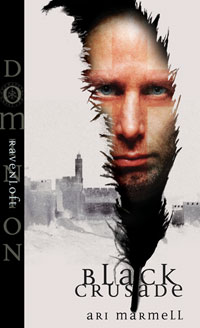Interview with Ari Marmell, author of Agents of Artifice
Posted on May 15, 2009 by Matt-M-McElroy
Agents of Artifice is your first Magic: the Gathering novel. How did you get introduced to the Magic setting?
 Well, I knew a tiny bit from the couple of times I’d played the game, and from picking stuff up here and there. But when I was first approached to write the book, I essentially undertook a crash course. The folks at Wizards sent me a lot of background material to read, and they also flew me up to Seattle where I spent an entire day in a meeting with the editorial and Magic staff. Between those two sources, and additional materials they sent me early in the writing process, I worked up a pretty solid foundation of basic knowledge.
Well, I knew a tiny bit from the couple of times I’d played the game, and from picking stuff up here and there. But when I was first approached to write the book, I essentially undertook a crash course. The folks at Wizards sent me a lot of background material to read, and they also flew me up to Seattle where I spent an entire day in a meeting with the editorial and Magic staff. Between those two sources, and additional materials they sent me early in the writing process, I worked up a pretty solid foundation of basic knowledge.
What do you like the most about Magic: the Gathering?
I like the variety inherent to the basic conceits of the game’s setting–or settings, really. The fact that it’s based around the notion of planeswalking, traveling to and summoning from an endless variety of worlds, means that the game, and stories set within the game’s multiverse, can draw on just about any sort of setting, and thus any sort of fantasy.
What were the biggest challenges while writing Agents of Artifice?
 Simple creative differences. Wizards put a lot of effort into this novel, and the new Planeswalkers line, and that meant that a lot of people had a stake in how the book turned out. A few creative differences with my editor and/or with the Magic staff, combined with the fact that I was still learning some details of the setting as I went along, meant that I had to do a lot more rewriting than I’m normally accustomed to.
Simple creative differences. Wizards put a lot of effort into this novel, and the new Planeswalkers line, and that meant that a lot of people had a stake in how the book turned out. A few creative differences with my editor and/or with the Magic staff, combined with the fact that I was still learning some details of the setting as I went along, meant that I had to do a lot more rewriting than I’m normally accustomed to.
I want to make it clear, though, that I’m not saying anyone did anything inappropriate. Creative differences are all but inevitable in a case like this, and a lot of the changes my editor asked for wound up making for a better book.
Did any particular cards inspire you while working on the book?
Well, in terms of some of the details, yes. Some locations (such as the Rubblefield) and many of the specific spells and creatures, were inspired by extant Magic cards. But in terms of the overall story, not so much.
Can you tell us a little more about Jace Beleren?
Hmm… I’m not sure I can tell you much more than what’s revealed in the novel itself. He’s a Planeswalker, and a man naturally skilled with magics of the mind and with illusion. At the start of his story, he’s not really a very good person–selfish, interested only in advancing his own position.
Without offering spoilers, I’ll say that I like to think that he’s grown somewhat over the course of the book, and he certainly thinks about more than just himself. But as far as giving anything more in the way of details about the character? I think I’ll leave that for future books, whether written by me or someone else.
You also have a Ravenloft novel called Black Crusade currently available on the Wizards of the Coast website, what can you tell us about it?
 Black Crusade was originally written to be the first in the Ravenloft: Dominion fiction line. The idea was to do a new Ravenloft series that drew characters from various points of Earth history, rather than drawing from different D&D worlds. Unfortunately, the book was delayed for various marketing reasons, and then the line itself was canceled. I was afraid Black Crusade would never see the light of day, until it appeared as a web-based weekly serial. (available now at Wizards.com)
Black Crusade was originally written to be the first in the Ravenloft: Dominion fiction line. The idea was to do a new Ravenloft series that drew characters from various points of Earth history, rather than drawing from different D&D worlds. Unfortunately, the book was delayed for various marketing reasons, and then the line itself was canceled. I was afraid Black Crusade would never see the light of day, until it appeared as a web-based weekly serial. (available now at Wizards.com)
In short, Black Crusade focuses on Diederic de Wyndt, a knight of the First Crusade. From the bloody sack of Jerusalem, we see Diederic get involved in the schemes of a priest by the name of Lambrecht Raes. Lambrecht’s dabbling with the occult leads to a series of horrific events–first in Jerusalem, and then in the nascent Ravenloft domain of Malosia, as Diederic attempts to pursue the heretic even through his peculiar, supernatural escape. Over the course of the novel, we follow Diederic as he tries to adapt to his new situation and continue his hunt for Lambrecht–despite the dangers to not only body, but soul, as he allows his lust for vengeance to threaten his sense of morality.
Ravenloft is a very different setting than Magic: the Gathering, do you have a preference between the two? Why or why not?
Well, at the moment I’m more fond of the gothic horror-fantasy, and the in-depth history of Ravenloft than I am of the more overt, high-magic and high-fantasy feel of Magic. But as I said above, Magic’s strength lies in its variety, so given the right world in the Magic multiverse and the right characters to work with, that preference could certainly change.
What can you tell us about The Plane Below and your other upcoming Dungeons & Dragons work?
 Obviously, I can’t go into any specific details on upcoming D&D books. I can say that “The Plane Below” is my first stint as the lead designer on a WotC book. That means that, while of course there was guidance and oversight from above, the overall outline of the book, and the decisions of what sort of materials to include and focus on, were mine. I’m quite happy with how the book came out, and I think DMs will find it a great inspiration, but I can hardly claim to be an unbiased source.
Obviously, I can’t go into any specific details on upcoming D&D books. I can say that “The Plane Below” is my first stint as the lead designer on a WotC book. That means that, while of course there was guidance and oversight from above, the overall outline of the book, and the decisions of what sort of materials to include and focus on, were mine. I’m quite happy with how the book came out, and I think DMs will find it a great inspiration, but I can hardly claim to be an unbiased source.
How is working on novels different from working on game material and which do you find more challenging?
While there’s substantial overlap in terms of the required skills, they’re actually two very different beasts. The prose in a game book should (in a perfect world, anyway) be just as evocative and flavorful as that of a novel, but with a very different purpose. The novel is meant to tell a story, to immerse the reader in the surroundings and actions of the characters; the game book has to be equally immersive, but instead inspire others to tell their own stories. It’s very easy to fall into the trap of including too much of one’s own story in game writing; but by the same token, an insufficient amount of flavor means that the book isn’t going to inspire the imagination. And of course, there are the mechanical aspects to consider, something that never even enters the equation when writing a novel.
As to which is more challenging? I’m not sure there’s a real answer to that. I think that game writing probably involves more of a fine balancing act between the two extremes mentioned above. On the other hand, because the mechanics do so much of the heavy lifting in a game book, there’s more of a safety net; if the narrative isn’t as strong as it could be, the book’s not automatically a failure. Maintaining a strong narrative and tone throughout a novel is far more important.
I’d say that adequate game writing is probably easier in the long run than adequate novel writing, because there’s usually multiple writers on a given book, which means that Author A can pick up Author B’s slack in one area, while B picks up A’s in another; and because someone who’s good at mechanics but not prose, or certain types of prose but not others, can still meaningfully contribute. But good writing is probably equally difficult for both.
About Ari Marmell
Ari Marmell was born in New York, moved to Houston when he was a year old, moved to Austin when he was 27, but has spent most of his life living in other worlds through a combination of writing and roleplaying games. He is the author of multiple roleplaying game supplements including work on Dungeons & Dragons and Vampire: the Requiem. Ari lives in Austin with his wife, George, and two cats. Visit his website Mouseferatu.com for more information.
Special Note:
If you’re a fan of Magic: the Gathering, you might be interested in our current contest. When you Send a Friend to GenCon for 2009, your friend will also receive a prize pack with goodies from Magic: the Gathering, too!
Tags | ari marmell, magic the gathering, ravenloft, wotc


Hello-
My name is Lisa Matthews and I am the Special Projects Coordinator for the Robeson County Public Library System. We would love to continue to offer the patrons of our rural community fun and exciting reading materials, but due to recent budget constraints that is almost impossible.. Our community is the third poorest county in the United States making us the poorest in North Carolina.and with these tough economic times the patrons of our area are the ones who are suffering. Your books would be perfect for our collection giving the patrons something to look forward to when entering our doors. Would you ever consider donating any of your titles to help us? Any amount would help and greatly be appreciated..
Thank you for your time, consideration and the devotion to our patrons,
Lisa Matthews,
RCPL
101 N Chestnut Street
Lumberton, North Carolina
28358
910-738-4859
Lisa, this is an entertainment news & review webzine, not a publisher website.
If you want to ask a publisher for books, you should probably talk directly to them and not post a comment on a news website.